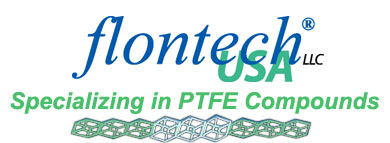The unique properties of polytetrafluoroethylene have made it an indispensible material for a broad and growing list of industries and applications. PTFE is the most widely used fluoropolymer. PTFE is a high molecular weight, strong carbon fluorine polymer. This extremely slippery, chemically inert polymer has the lowest coefficient of friction of any solid and is very thermally stable. However, unfilled or virgin PTFE is sometimes an inadequate material for many applications; adding fillers to PTFE results in a fluoropolymer compound with improved properties. When a filler or an assortment of fillers is integrated into PTFE, the result is known as a PTFE compound.
Flontech USA insures the refinement of all of our fillers through such processes as superior sourcing, impurity removal, tight particle size control and laser verification. Our processes guarantee our compounds are only produced with fillers of the most superior quality. Serving a wide array of professional industries such as aerospace, chemical and food processing, and health care, our advanced fillers are equipped with a variety of electrical, mechanical, thermal and tribological properties that help provide improved wear resistance, increased hardness and thermal conductivity, and reduced linear coefficient of thermal expansion and contraction. Generally, PTFE compounds maintain PTFE’s excellent chemical and high temperature characteristics. We also offer pigments in most any color individually or in any combination and percentage customized to your specifications. Flontech USA is interested in meeting your compounding needs by utilizing any and all fillers in any combination and filler percentage. We will also speckle your compounds as well as color match any of your current products.
From bearings and brake pads to clutches, gaskets and hydraulic piston rings, our superior fillers are designed for a vast number of applications and from a wide variety of materials including, but not limited to, aramid, calcium fluoride, graphite, hard or soft carbon and polyphenylene sulphone. If you require a filler material we do not stock, we will special order it for you.
Please inquire today to receive more information regarding our superior fillers and compounds.
Flontech USA insures the refinement of all of our fillers through such processes as superior sourcing, impurity removal, tight particle size control and laser verification. Our processes guarantee our compounds are only produced with fillers of the most superior quality. Serving a wide array of professional industries such as aerospace, chemical and food processing, and health care, our advanced fillers are equipped with a variety of electrical, mechanical, thermal and tribological properties that help provide improved wear resistance, increased hardness and thermal conductivity, and reduced linear coefficient of thermal expansion and contraction. Generally, PTFE compounds maintain PTFE’s excellent chemical and high temperature characteristics. We also offer pigments in most any color individually or in any combination and percentage customized to your specifications. Flontech USA is interested in meeting your compounding needs by utilizing any and all fillers in any combination and filler percentage. We will also speckle your compounds as well as color match any of your current products.
From bearings and brake pads to clutches, gaskets and hydraulic piston rings, our superior fillers are designed for a vast number of applications and from a wide variety of materials including, but not limited to, aramid, calcium fluoride, graphite, hard or soft carbon and polyphenylene sulphone. If you require a filler material we do not stock, we will special order it for you.
Please inquire today to receive more information regarding our superior fillers and compounds.
Unit of Measure
Capabilities
Fillers Available |
N/A Aramid Calcium Fluoride Carbon Fiber Ceramic Conductive Carbon Glass Graphite Hard Carbon Mineral Moly Nickel PEEK Polyester Polymide Polyphenylene Sulphone PPS Soft Carbon |
Conventional Fillers
Carbon (Hard and Soft) |
N/A Electrically conductive Improves lubricity Improves wear characteristics Increases Hardness Increases thermal conductivity One of the most inert fillers Reduces creep |
Bronze |
N/A Better dimensional stability, higher thermal conductivity, lower creep and cold flow Improved hardness, lower wear, higher comprehensive strength |
Graphite |
N/A Chemically inert Improved thermal conductivity Reduces initial wear and provides general strengthening characteristics Reduces startup friction Used in compounds for chemical and mechanical service |
Carbon Fiber |
N/A Chemically inert to hydrofluoric acid and strong bases Increases flex and compressive modulus Increases hardness Increases thermal conductivity Increases wear resistance Less carbon fiber needed compared to glass to achieve the same effect Lowers creep |
Glass Fibers |
N/A Adds to mechanical properties Chemically, electrically and mechanically balanced properties Increases wear resistance Least effect on chemical and electrical properties |
Molybdenum Disulfide |
N/A Increased hardness, stiffness and wear resistance Reduces startup friction |
| Other Fillers used in PTFE Compounds1 | N/A Ekonol PEEK Polyimide Polyphenylene Sulphide Stainless Steel |
Properties
Electrical |
N/A Decreased Dielectric Strength Increased Dielectric Constant & Dissipation |
Mechanical |
N/A Increased Hardness Reduced Creep |
Thermal |
N/A Reduced Linear Coefficient of Thermal Expansion & Contraction |
Tribological |
N/A Absorbs small amounts of Moisture Improved Wear Resistance Increased Compressive Strength Increased Hardness Increased Thermal Conductivity Lower Deformation of Creep Reduced Wear Rate |
- 1 Each offering advantages to specific applications


